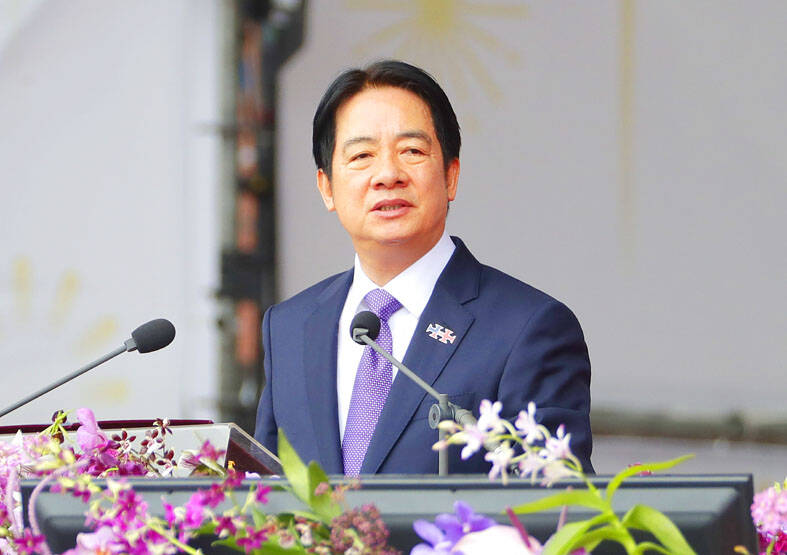The people chosen to accompany President William Lai (賴清德) on his first official overseas visit gives a glimpse into his wider Pacific strategy, the head of a Taiwanese think tank said on Sunday.
Members of Lai’s delegation for the upcoming trip include Council of Indigenous Peoples (CIP) head Ljaucu Zingrur, Ocean Affairs Council Minister Kuan Bi-ling (管碧玲), Deputy Minister of Health and Welfare Lin Ching-yi (林靜儀) and Minister of Foreign Affairs Lin Chia-lung (林佳龍), the Presidential Office has said.
Think tank Prospect Foundation president Lai I-chung (賴怡忠) said the delegation picks suggests a specific focus on cultural, maritime, medical and diplomatic matters.

Photo: Chiang Ying-ying, AP
The president is to visit three diplomatic allies in the Pacific — the Marshall Islands, Tuvalu and Palau — on a trip from Saturday to Friday next week, the Presidential Office said on Friday.
Lai I-chung said that Austronesian culture in Pacific island nations was similar to that of Taiwan’s indigenous peoples, and that the CIP head’s presence suggested that building cultural ties would be a focus of the trip.
Kuan’s participation indicated that managing maritime affairs was also a policy focus, he added.
Lin Ching-yi’s inclusion highlights Taiwan’s commitment to bolstering cooperation with diplomatic allies, particularly in areas such as health promotion, public health, smart healthcare and social services, while Lin Chia-lung’s participation underscores the president’s prioritization on diplomacy and security in his Pacific strategy, he said.
The diplomatic allies in the Pacific are a key link between the US and the first island chain in the Western Pacific, and maintaining solid communication with those allies is key to strong Taiwan-US relations, Lai I-chung said.
That the trip does not include a stop in a US territory has been interpreted by some analysts as a sign of mistrust from the US.
Lai I-chung said that based on precedent, no Taiwanese president has specifically flown to Los Angeles or San Francisco and then backtracked to the Pacific when visiting Pacific allies.
“There is no need to transit the US just for the sake of deliberately transiting the US,” he said.
He questioned the idea that the US did not trust Taiwan, saying that US President Joe Biden’s administration recently approved a significant arms sale to Taiwan.
With Biden nearing the end of his term, there was no obligation to proceed with the deal, yet the administration chose to proceed, he said.
Last month, the US government approved the potential sale of an estimated US$1.988 billion of radar turnkey systems and surface-to-air missile systems.

Hong Kong-based American singer-songwriter Khalil Fong (方大同) has passed away at the age of 41, Fong’s record label confirmed yesterday. “With unwavering optimism in the face of a relentless illness for five years, Khalil Fong gently and gracefully bid farewell to this world on the morning of February 21, 2025, stepping into the next realm of existence to carry forward his purpose and dreams,” Fu Music wrote on the company’s official Facebook page. “The music and graphic novels he gifted to the world remain an eternal testament to his luminous spirit, a timeless treasure for generations to come,” it said. Although Fong’s

China’s military buildup in the southern portion of the first island chain poses a serious threat to Taiwan’s liquefied natural gas (LNG) supply, a defense analyst warned. Writing in a bulletin on the National Defense and Security Research’s Web site on Thursday, Huang Tsung-ting (黃宗鼎) said that China might choke off Taiwan’s energy supply without it. Beginning last year, China entrenched its position in the southern region of the first island chain, often with Russia’s active support, he said. In May of the same year, a Chinese People’s Liberation Army Navy (PLAN) force consisting of a Type 054A destroyer, Type 055 destroyer,

Actor Darren Wang (王大陸) was questioned by prosecutors for allegedly orchestrating an attack on a taxi driver after he was allegedly driven on a longer than necessary route in a car he disliked. The questioning at the New Taipei City District Prosecutors’ Office was ongoing as of press time last night. Police have recommended charges of attempted murder. The legally embattled actor — known for his role in the coming-of-age film Our Times (我的少女時代) — is under a separate investigation for allegedly using fake medical documents to evade mandatory military service. According to local media reports, police said Wang earlier last year ordered a

Taiwan is planning to expand the use of artificial intelligence (AI)-based X-ray imaging to customs clearance points over the next four years to curb the smuggling of contraband, a Customs Administration official said. The official on condition of anonymity said the plan would cover meat products, e-cigarettes and heated tobacco products, large bundles of banknotes and certain agricultural produce. Taiwan began using AI image recognition systems in July 2021. This year, generative AI — a subset of AI which uses generative models to produce data — would be used to train AI models to produce realistic X-ray images of contraband, the official